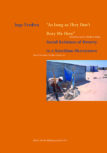“As Long as They Don’t Bury Me Here”. Social Relations of Poverty in a Namibian Shantytown
- Language: English
- 216 pages
- Illustrations, tables, maps, index
- Vol. 11, 2011
- ISSN: 2234-9561
- ISBN:
- Print: 978-3-905758-24-5
- PDF: 978-3-905758-44-3
“As Long as They Don’t Bury Me Here”. Social Relations of Poverty in a Namibian Shantytown
An increasing number of poor Southern Africans live in poverty-stricken urban slums or shantytowns. Focusing on four shantytowns in the northern Namibian town of Oshakati, this book analyses the coping strategies of the poorest sections of such populations. The study is based on fieldwork conducted intermittently during a period of ten years. It combines theories of political, economic and cultural structuration, and of the material and cultural basis for social relations of inclusion and exclusion as practise. The poorest shanty dwellers are marginalised or excluded from vital urban and rural relationships and forced into social relations of poverty amongst themselves. Having experienced long-term processes of impoverishment, the very poorest and most destitute in the shantytowns tend to give up improving their lives and act in ways that further undermine their position.
Dr. Inge Tvedten is anthropologist and senior researcher at the Chr. Michelsen Institute in Bergen, Norway. He has extensive experience from basic and applied research on urban and rural poverty as well as on gender equality and women empowerment, primarily in Southern Africa. His publications include books on associational life in urban Africa and on development and poverty in Angola, and a series of studies on gender and development in Mozambique.
Telling their story over many years: An Introduction by Michael Bollig
1 Introduction
2 The Making of Oshakati and its Shantytowns
3 Global Space and Urban Place
4 The Shanty Population and Inequalities
5 Social Relations of Poverty
6 Rural Links
7 Urban Connections
8 Intra-Household Relationships
9 Overwhelmed by Poverty
10 Conclusions
“This book not only offers a detailed and well-grounded account of the origins and contemporary faces of urban African poverty and marginality: it provides a theoretical and meaningful framework through which to view the actors, their fates, their ideas and their activities in great detail. As such, the book succeeds in restoring some of their dignity.”
Michael Bollig, University of Cologne

